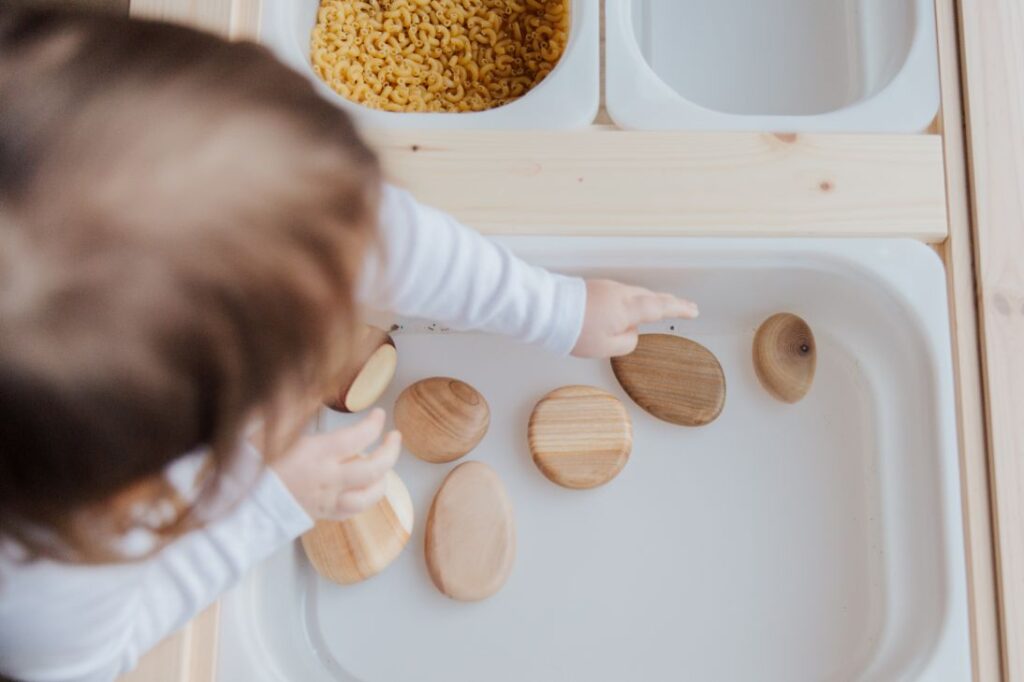Imagine this. Your 7-month-old is engrossed. Their small, curious hands eagerly explore a new toy. Their eyes, wide and sparkling, light up with newfound understanding and joy.
This engaging scene could be a regular part of your baby’s playtime with the right Montessori toys.
This article delves into five must-have Montessori toys that entertain while fostering your baby’s cognitive and motor development.
Table of Contents
Understanding Montessori Philosophy

Born out of Dr. Maria Montessori’s research and practice, the Montessori learning philosophy fosters independence and encourages self-directed learning from a young age.
Respect for a child’s natural psychological development is at the heart of it.
This philosophy is not just an educational doctrine but is deeply beneficial for infants, including 7-month-old babies. Exposing them to Montessori toys helps enhance their independence and problem-solving skills.
The American Journal of Play article shows how the Montessori approach has significantly improved a child’s problem-solving abilities.
The Montessori philosophy, when applied early on, can bear fruitful outcomes.
Montessori Object Permanence Box
Meet the first toy on our list: the Montessori Object Permanence Box. With a small ball and a fitted hole, this intriguing box supports your baby’s understanding of object permanence – the realization that things continue to exist even when they cannot be seen, heard, or touched.
To get the most out of this toy, sit with your baby and demonstrate how to drop the ball into the hole. Then, watch their delight unfold when the ball reappears in the tray. Gradually, your baby will replicate your actions, grasping the concept of object permanence.
One parent shared how their child’s playtime with the Object Permanence Box sparked their curiosity.
As the child understood the mechanics, their exploration extended to other toys and objects, pointing to the toy’s developmental impact.
Read: Members Mark Diapers Review
Wooden Stacking Rings
Next up is the Wooden Stacking Rings. This simple toy does wonders for developing motor skills and understanding sizes and sequences.
Made of varying-sized rings, this toy helps babies understand the concept of bigger and smaller while practicing their grasp and coordination.
Start with two or three rings and let your baby try to stack them. Over time, introduce more rings and encourage your baby to stack them in order. With each attempt, they’ll hone their fine motor skills and coordination.
Child development specialist Dr. Jane Williams notes, “Stacking toys offer a hands-on approach to learning about sizes, sequences, and problem-solving, which are integral to a child’s cognitive development.”
Soft Montessori Balls
Third on our list are the Soft Montessori Balls. Perfect for tiny hands, these balls serve as excellent sensory toys, promoting tactile sensation and hand-eye coordination.
Each ball, made from different textured fabrics, provides a unique sensory experience to your baby.
You can incorporate these balls into a variety of everyday play scenarios. Roll them back and forth during tummy time, or use them during story time to capture your baby’s attention.
An Infant Behavior and Development journal study found that babies exposed to various tactile stimuli showed better motor response and tactile perception. Undoubtedly, sensory play with Soft Montessori Balls can be a building block for your baby’s development.
Read: 4 Things All Single Moms Should Know
Montessori Baby Mirror
The Montessori Baby Mirror, typically a shatterproof acrylic mirror, is another Montessori toy that supports your baby’s development. Mirrors fascinate babies.
They promote self-recognition, sensory stimulation, and even emotional development.
Ensure the mirror is securely mounted or held at your baby’s level. Let your baby see their reflection and watch as they react to the ‘other baby’ in the mirror.
A mother recounted how her baby started displaying self-awareness with the help of a Montessori mirror. The child would make faces in the mirror and giggle, noticing that the ‘other baby’ mimicked her.
Such experiences illustrate the mirror’s role in self-awareness and emotional development.
Textured Teething Toys
Lastly, textured teething toys are crucial for any 7-month-old. These toys can relieve teething discomfort while promoting sensory exploration. Textured surfaces provide intriguing tactile experiences for babies, fostering their curiosity.
Offer these toys when your baby shows signs of teething discomfort. Not only will these provide relief, but they will also serve as a distraction, keeping your baby engaged.
Research published in Pediatrics showed that textured toys could significantly relieve teething discomfort and contribute to a baby’s sensory development.
Conclusion
To sum up, Montessori toys like the Object Permanence Box, Wooden Stacking Rings, Soft Montessori Balls, Baby Mirror, and Textured Teething Toys can play a substantial role in your 7-month-old’s development journey.
Aligning with the Montessori philosophy, these toys promote independence, cognitive growth, and sensory exploration.
By including these in your child’s play routine, you’re setting the stage for an engaging, educational, and enjoyable growth journey for your little one.
By understanding the philosophy and the intent behind these toys, you can enrich your baby’s playtime, turning it into a powerful learning opportunity.
Read: Chicco Corso Le Modular Travel System Review
So, get started today and witness the joy and benefits these toys bring into your child’s life.


















